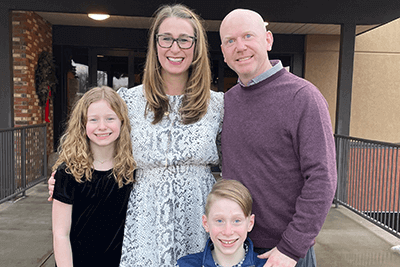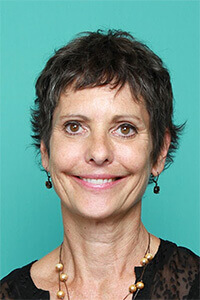June 7, 2022
 Since its founding, MPA has pioneered whole child education in the Twin Cities with a commitment to helping students deepen their understanding of themselves and the world around them. We persistently innovate in alignment with that core value, providing experiences that are challenging to replicate anywhere else.
Since its founding, MPA has pioneered whole child education in the Twin Cities with a commitment to helping students deepen their understanding of themselves and the world around them. We persistently innovate in alignment with that core value, providing experiences that are challenging to replicate anywhere else.
One of MPA’s visionary programs is the Graduate Certificate of Distinction (GCD). It inspires students’ educational quests in one of four areas: Global Studies, Science Technology Engineering Math & Design (STEM), Fine Arts, and as of this year, Literary Arts. Consistent with the essence of student voice, where students actively shape curriculum and impact their education, MPA encourages and recognizes excellence that takes place outside of our already rigorous curriculum. The GCD program was designed to provide committed students a way to formalize their work. Further, it embodies MPA’s willingness to encourage engagement between students and teachers. A journey of passion, commitment, and hard work, the amount of individualized engagement required to successfully support Upper School students who pursue this challenge can only be offered by a dedicated faculty that interacts one-on-one with each candidate.
“Over the years, Upper School faculty and administrators observed amazing kids pursuing what could only be described as ‘passion projects’—students who dove into fields purely to spend time deepening their understanding,” faculty advisors Kari Kunze (Global), Lisa Buck (Fine Arts), and Jane Anderson (STEM) share. “They were not necessarily those with the highest test scores or GPAs, but students who were independently driven to quench their own thirst for knowledge.”
The GCD program is not a one-size-fits-all concept, nor is it for the majority of students. It’s a time-consuming experience for juniors and seniors who are already naturally exploring multiple subjects in depth. And it’s clear that the student must be leading the process to make this work.
“If you imagine the candidate in front of the line with the advisor close behind and their family supporting from the rear, that’s a good model,” observes Buck. The faculty advisor serves as a sounding board or brainstorming partner and parents can help by factoring their student’s area of passion into family activities, but ultimately, the student is responsible for seeking out new experiences that support the GCD honor. “What those kids offer, in terms of sharing what they’ve pursued, is extremely inspiring to us as teachers and advisors,” says Kunze. “The role of the faculty is to incite curiosity, help build confidence, and cheer them on, but we gain a great deal in the process,” Buck adds.
 Class of 2018 alum Pranay Somayajula, now at The George Washington University, shares that he chose to pursue the Global Certificate and “the most valuable part of the program was the way it motivated me to get out of my comfort zone and explore the full range of cultural and foreign-policy opportunities the Twin Cities has to offer.” Maija Olson ’17 reflects on her Global Certificate as well, saying, “The freedom to guide my learning offered a new kind of independence. I enjoyed the ability to deeply explore various world issues and focus on something I was truly passionate about.”
Class of 2018 alum Pranay Somayajula, now at The George Washington University, shares that he chose to pursue the Global Certificate and “the most valuable part of the program was the way it motivated me to get out of my comfort zone and explore the full range of cultural and foreign-policy opportunities the Twin Cities has to offer.” Maija Olson ’17 reflects on her Global Certificate as well, saying, “The freedom to guide my learning offered a new kind of independence. I enjoyed the ability to deeply explore various world issues and focus on something I was truly passionate about.”
The final presentations have turned out to be transformational for students–sometimes unexpectedly. Even when candidates were extremely nervous to get up before their teachers and present their reports at the end of their senior year, there is an evident level of maturity and empowerment along with a feeling of great accomplishment once they were done.
Alex Esch ’18 remarks that although she would’ve completed all the necessary hours in the Fine Arts area because of her personal interest, “The presentation requirement was incredibly valuable because it gave me the opportunity to share my passion and all the work I completed with teachers and fellow classmates. It was amazing to feel the support of the MPA community—especially from my personal advisor, Ms. Buck—as I expressed my love of the fine arts. She was always willing to answer questions and just be there as part of my artist’s journey.” It is truly a unique opportunity to be recognized by academic elders who have served as mentors and who can now formally honor the students’ hard work and devotion to education.
These students are charting their own course—one that can’t be shown by test scores, GPAs, or more traditional forms of recognition. The GCD program takes whole child education to a deeper level, honoring the unique contributions and multi-faceted academic experiences of each candidate. We’re looking for students to push themselves out of their normal routine in order to build multiple capabilities that intersect.
For more information on MPA’s Graduate Certificate of Distinction program, visit moundsparkacademy.org/gcd.
 Meet Amina Brewer, an MPA junior entering her third year at MPA!
Meet Amina Brewer, an MPA junior entering her third year at MPA! What position will you be holding at MPA?
What position will you be holding at MPA?  If you’ve been on campus lately, you’ve probably noticed something different about MPA’s pond–and not just the seasonal algae. This summer, the pond is adorned with trucks, cranes, bulldozers, gravel, and boulders. We have an exciting update about all of this action and commotion around our beloved outdoor learning lab.
If you’ve been on campus lately, you’ve probably noticed something different about MPA’s pond–and not just the seasonal algae. This summer, the pond is adorned with trucks, cranes, bulldozers, gravel, and boulders. We have an exciting update about all of this action and commotion around our beloved outdoor learning lab. Meet Frances, who will be beginning her third and senior year at MPA this fall.
Meet Frances, who will be beginning her third and senior year at MPA this fall. Parent of alumni and fourth grade teacher DeeDee Stacy shares her experience hosting Lyndon Lyu ’20.
Parent of alumni and fourth grade teacher DeeDee Stacy shares her experience hosting Lyndon Lyu ’20. Dear MPA Community,
Dear MPA Community, Meet Samantha Forgosh, a recent MPA Class of 2022 graduate and proponent of the many possibilities and experiences MPA had to offer during her time as a student.
Meet Samantha Forgosh, a recent MPA Class of 2022 graduate and proponent of the many possibilities and experiences MPA had to offer during her time as a student. Congratulations to Evan Fraser, the 2022 Class A Singles State Champion in Boys Tennis! Evan is from Nova Classical Academy and a member of the Panthers Co-op.
Congratulations to Evan Fraser, the 2022 Class A Singles State Champion in Boys Tennis! Evan is from Nova Classical Academy and a member of the Panthers Co-op. Please help us welcome Dr. Ann Jurewicz, interim Lower School director, to MPA!
Please help us welcome Dr. Ann Jurewicz, interim Lower School director, to MPA! Since its founding, MPA has pioneered whole child education in the Twin Cities with a commitment to helping students deepen their understanding of themselves and the world around them. We persistently innovate in alignment with that core value, providing experiences that are challenging to replicate anywhere else.
Since its founding, MPA has pioneered whole child education in the Twin Cities with a commitment to helping students deepen their understanding of themselves and the world around them. We persistently innovate in alignment with that core value, providing experiences that are challenging to replicate anywhere else. Class of 2018 alum Pranay Somayajula, now at The George Washington University, shares that he chose to pursue the Global Certificate and “the most valuable part of the program was the way it motivated me to get out of my comfort zone and explore the full range of cultural and foreign-policy opportunities the Twin Cities has to offer.” Maija Olson ’17 reflects on her Global Certificate as well, saying, “The freedom to guide my learning offered a new kind of independence. I enjoyed the ability to deeply explore various world issues and focus on something I was truly passionate about.”
Class of 2018 alum Pranay Somayajula, now at The George Washington University, shares that he chose to pursue the Global Certificate and “the most valuable part of the program was the way it motivated me to get out of my comfort zone and explore the full range of cultural and foreign-policy opportunities the Twin Cities has to offer.” Maija Olson ’17 reflects on her Global Certificate as well, saying, “The freedom to guide my learning offered a new kind of independence. I enjoyed the ability to deeply explore various world issues and focus on something I was truly passionate about.”